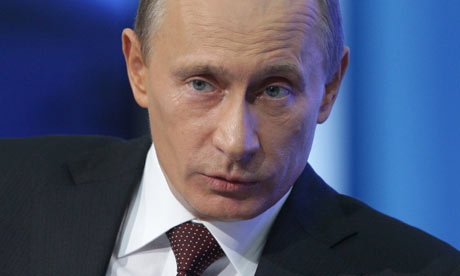
Pro-Moscow Activists Deny Parallels between Crimea and North Caucasus
Publication: Eurasia Daily Monitor Volume: 11 Issue: 90
By:

Many observers see striking parallels between the situations in Ukraine and in the North Caucasus; and many, unsurprisingly, have started asking whether the annexation of Crimea and the fueling of separatism in southeastern Ukraine will have repercussions for Russia in the North Caucasus.
At a conference in Moscow on May 7, Russian Civil Society Development Foundation Chairman Konstantin Kostin vehemently denied Russia may face consequences for its policies in Ukraine back home. The struggle of the residents of southeastern Ukraine for their rights and terrorist attacks in the North Caucasus are two different things, the expert said. “These are two principally different situations: people state their political demands [in Ukraine], while the terrorists [in the North Caucasus] are far from seeking political changes,” Kostin asserted. To support his claim, the expert said that “in Russia there has never been a situation when human rights violations took place on a mass scale and the government was powerless, so the comparison is incorrect” (https://www.regnum.ru/news/polit/1799388.html#ixzz31A9gR7cr).
Kostin hardly represents Russian civil society; rather, he is known for spearheading the government’s attack against Russian opposition leader Alexei Navalny (https://navalny.livejournal.com/863598.html). Kostin’s opinion is still interesting because it is likely to represent the thinking of part of the Russian establishment. As Moscow becomes increasingly involved in Ukraine, its rhetoric about supporting ethnic Russians in Ukraine is progressively at odds with its rhetoric and policies in the North Caucasus.
Speaking on May 9 at a public event dedicated to the victory over Germany in 1945, Russian President Vladimir Putin said: “We respect all countries and all nations, their lawful rights and interests, but we also ask others to have the same attitude to our lawful interests, including the restoration of historical justice and right to self-determination” (https://www.kremlin.ru/transcripts/20993). Having endorsed the right of self-determination for ethnic Russians in Crimea and, tacitly so, those in southeastern Ukraine, Vladimir Putin has overlooked the North Caucasus, where Chechens and others have struggled for the right of self-determination for decades and have been suppressed by Russia’s overwhelming military force.
Unfortunately for the Russian protagonists of Moscow’s “just” struggle against terrorists in the North Caucasus, there actually are North Caucasian political leaders who call for independence whenever possible. In 2008, following the killing of renowned Ingush activist Magomed Yevloev, his colleague, Magomed Khazbiev, stated: “We need to ask Europe and America to detach us from Russia. If we are unwelcome in this country [Russia] we do not know what else we can do” (https://www.newsru.com/russia/31aug2008/haz.html).
More recently, Ingush political activists made secessionist demands following Russia’s annexation of Crimea. Ibragim Lyanov proposed that Ingushetia also hold a referendum on secession from the Russian Federation, and said an international peacemaking force should be stationed in the republic while it is being carried out (https://www.habar.org/?p=30073).
This proposal is not unlike what Russia did in Crimea. During his live nationwide phone-in broadcast on April 17, President Putin confirmed the involvement of Russian military forces in Crimea prior to the March 16 referendum: “Our task was not to utilize our armed forces in their actual capacity there, but rather provide for the safety of the citizens and favorable conditions for the expression of their will” (https://www.kremlin.ru/transcripts/20796).
In a March 18 speech, Putin stated that Ukraine cited the Charter of the United Nations when seceding from the Union of Soviet Socialist Republics (USSR) in 1991: “Ukraine made use of this right [to self-determination], while they are denying it to the Crimeans. Why?” (https://www.kremlin.ru/transcripts/20603).
Chechnya made the same claim to self-determination following the demise of the Soviet Union, but Moscow launched a brutal conquest of the region, killing thousands of civilians, while the international community largely remained uninvolved in the conflict. Even now, Russian government forces kill hundreds of people in the North Caucasus every year, and while most of them are written off as terrorists, many of the victims are civilians.
While indulging in an expressly colonial war in the North Caucasus, suppressing ethnic non-Russians, Moscow facilitates the secession of ethnic Russians from Ukraine and their irredentist aim of joining Russia. Glaring double standards of the Russian government are hardly novel to anyone, but they do not go unnoticed in the North Caucasus. Of course, Moscow expects the world to succumb to its actions because Russia is a nuclear power. But, as history shows, having nuclear weapons does not prevent the demise of states.
Another pillar of contemporary Russia is ethnic-Russian nationalism, and Putin is tapping into it, referring to ethnic Russians as the “largest divided nation in the world” and emphasizing the Russian ethnic nationalist goal of “gathering the Russian lands” in his March 18 speech (https://www.kremlin.ru/transcripts/20603). Indeed, as ethnic-Russian nationalism rises, it is likely to increasingly collide with both external and internal opponents. And the North Caucasus is the most probable domestic target of the newly renovated Russian nationalism.




